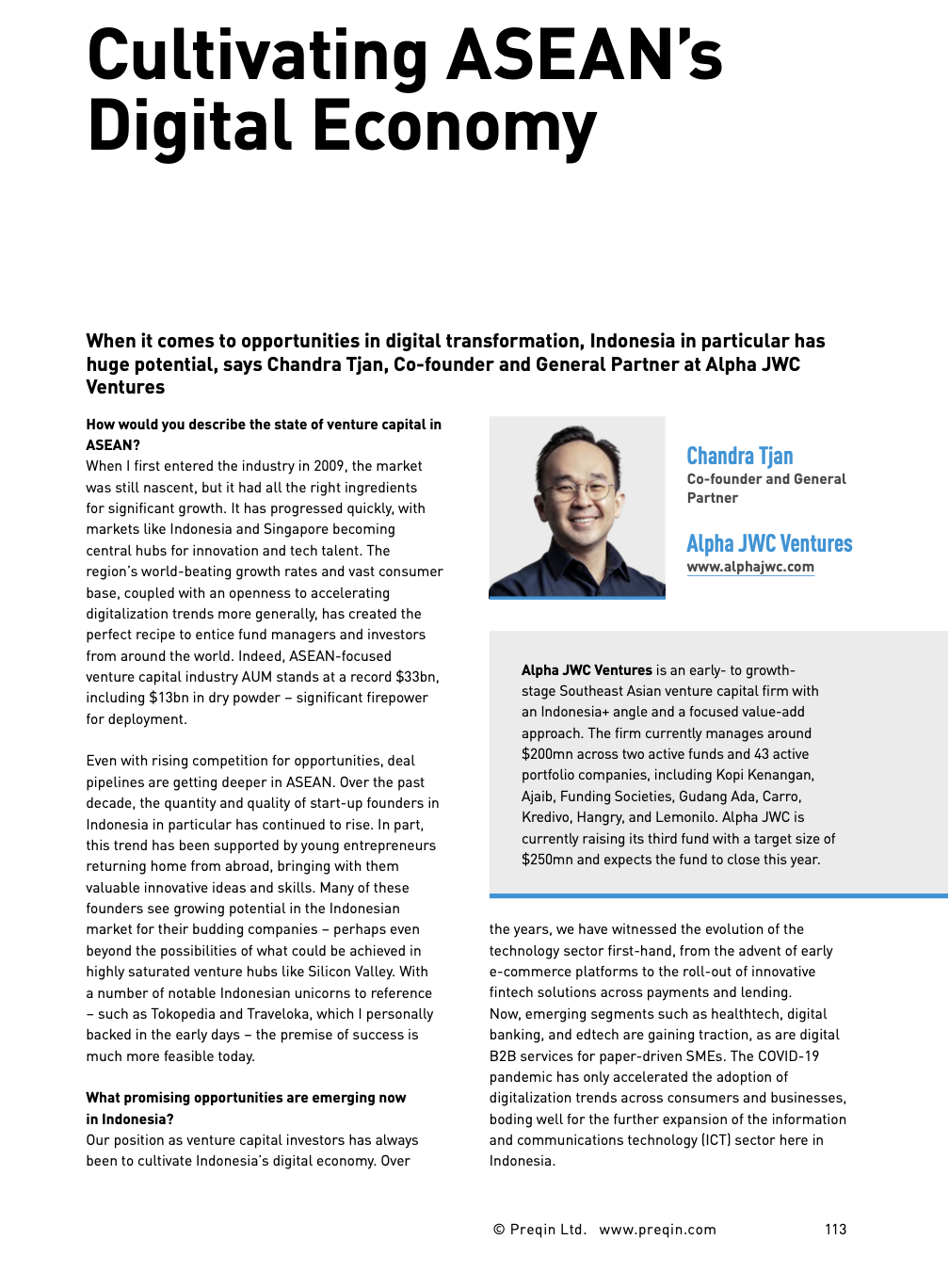When it comes to opportunities in digital transformation, Indonesia, in particular, has huge potential, says Chandra Tjan, Co-founder and General Partner at Alpha JWC Ventures.
How would you describe the state of venture capital in ASEAN?
When I first entered the industry in 2009, the market was still nascent, but it had all the right ingredients for significant growth. It has progressed quickly, with markets like Indonesia and Singapore becoming central hubs for innovation and tech talent. The region’s world-beating growth rates and vast consumer base, coupled with an openness to accelerating digitalization trends more generally, has created the perfect recipe to entice fund managers and investors from around the world. Indeed, ASEAN-focused venture capital industry AUM stands at a record $33bn, including $13bn in dry powder – significant firepower for deployment.
Even with rising competition for opportunities, deal pipelines are getting deeper in ASEAN. Over the past decade, the quantity and quality of start-up founders in Indonesia in particular has continued to rise. In part, this trend has been supported by young entrepreneurs returning home from abroad, bringing with them valuable innovative ideas and skills. Many of these founders see growing potential in the Indonesian market for their budding companies – perhaps even beyond the possibilities of what could be achieved in highly saturated venture hubs like Silicon Valley. With a number of notable Indonesian unicorns to reference – such as Tokopedia and Traveloka, which I personally backed in the early days – the premise of success is much more feasible today.
What promising opportunities are emerging now in Indonesia?
Our position as venture capital investors has always been to cultivate Indonesia’s digital economy. Over the years, we have witnessed the evolution of the technology sector first-hand, from the advent of early e-commerce platforms to the roll-out of innovative fintech solutions across payments and lending. Now, emerging segments such as health ech, digital banking, and edtech are gaining traction, as are digital B2B services for paper-driven SMEs. The COVID-19 pandemic has only accelerated the adoption of digitalization trends across consumers and businesses, boding well for the further expansion of the information and communications technology (ICT) sector here in Indonesia.
Although the journey up until this point has been impressive, much remains to be done. We have only scraped the surface of digital business opportunities available in the country; the full potential of the start-up ecosystem has yet to be unlocked. Improvements across infrastructure, talent, consumer education, and access to capital have a long way to go. Even the seemingly ‘established’ e-commerce sector is still opening itself up to servicing new niche verticals and customer segments.
Our own portfolio, for example, holds a few social commerce companies that cater to unique customer segments via innovative consumer engagement through social platforms. Indonesia-based Evermos, a commerce platform catering to Muslims with Sharia- compliant products, and Raena, a niche beauty product platform, are good case studies in this segment. New iterations of existing consumer-oriented digital start- ups such as these will emerge to satisfy changing demands in a maturing market. Simply put, there is no shortage of opportunities in Indonesia.
More interesting, perhaps, is the latent potential of cities beyond the major metropolitan areas of Greater Jakarta, Surabaya, and Bandung (tier 1) which have been the traditional centralized locations for business and venture activity. Indonesia has 514 cities and regencies, of which tier 1 cities dominate the composition of national GDP. We expect this to change as tier 2 and tier 3 cities – such as Semarang and Magelang – outpace the growth of longstanding tier 1 hubs, expanding their share of national GDP by 3-5% by 2030.
Despite their rising prominence, these cities are 3-5 years behind on their digitalization journey compared with Greater Jakarta. As these rural areas and populations become more integrated into the digital economic fold, success for existing and newly emerging start-ups will depend more on succeeding in these locations.
As the venture capital market has matured, have you changed your approach to identifying opportunities?
To answer this question, it is important to highlight that ASEAN – although commonly seen by many as a collective whole – is a very heterogenous market. For investors, this means what might work in a market like Singapore may not succeed in Indonesia. A local context is important, especially in ASEAN, where intimate, on-the-ground knowledge plays a bigger role in success than in other more developed markets in the West or even Asia. Localization has been a vital part of our own investment strategy for many years – we seek products and services that solve unique challenges faced by local customers.
As the industry has matured, we have held true to many of our core investment premises. This has served us very well. A company’s underlying unit economics and the quality of its founding team are paramount. On the other hand, some perspectives have had to adapt with the changing needs of the venture capital market. Since the pandemic, for example, like many venture capital firms, we are more selective – betting bigger on fewer start-ups. The industry is catching up to the idea that growth at all costs is not sustainable, a long-term ideal of ours that has been reinforced. A clear roadmap, tailored to each company, is essential in today’s hyper-competitive landscape. And after last year, the adaptability and flexibility of founders through uncertain times has also become more important.
Looking forward, where do you see the industry heading?
Indonesia is well-positioned to be the next digital hub in Southeast Asia. On the back of this, more venture capital firms will emerge in the country, and more global investors will tap into a deepening opportunity pipeline in the coming years. In addition, institutional investors from across developed Asia and the West are seeking greater exposure to Indonesia. This is a good thing for the start-up ecosystem: access to capital and expertise will be in high demand as the industry progresses. For firms like Alpha JWC Ventures with the scale to showcase the Indonesian digital economy on the global stage, while at the same time building it up from within, the future looks very bright.
Read the complete Preqin Report, Preqin Market in Focus: Alternative Assets in Asia Pacific 2020 – 2021 here.



